形容词比较级和最高级的构成
形容词的比较级和最高级如何构成

形容词的比较级和最高级如何构成?形容词的比较级(Comparative Degree)和最高级(Superlative Degree)用于表示事物在某个特征上的相对程度。
形容词的比较级用于将两个事物进行比较,而最高级则用于将三个或更多事物进行比较。
一般来说,形容词的比较级和最高级的构成方式如下:1. 单音节形容词:-比较级:在形容词后面加上-er。
例如:big(大)→ bigger(更大的)。
-最高级:在形容词后面加上-est。
例如:big(大)→ biggest(最大的)。
2. 以辅音字母+y结尾的形容词:-比较级:将y 变为i,然后加上-er。
例如:funny(有趣的)→ funnier(更有趣的)。
-最高级:将y 变为i,然后加上-est。
例如:funny(有趣的)→ funniest(最有趣的)。
3. 以重读闭音节结尾的形容词(以一个元音字母加一个或多个辅音字母结尾):-比较级:双写最后一个辅音字母,然后加上-er。
例如:big(大)→ bigger(更大的)。
-最高级:双写最后一个辅音字母,然后加上-est。
例如:big(大)→ biggest(最大的)。
4. 多音节形容词和部分双音节形容词:-比较级:在形容词前面加上more。
例如:beautiful(美丽的)→ more beautiful(更美丽的)。
-最高级:在形容词前面加上most。
例如:beautiful(美丽的)→ most beautiful(最美丽的)。
需要注意的是,有一些形容词的比较级和最高级是不规则的,它们不能通过上述规则进行构成,而是需要特殊记忆。
例如:good(好的)→ better(更好的)→ best(最好的)。
此外,还有一些形容词是无法进行比较级和最高级的,因为它们本身已经表示了极端程度,如unique(独特的)、perfect(完美的)等。
掌握形容词比较级和最高级的构成方式对于准确描述事物的特征和进行比较是非常重要的。
形容词的比较级和最高级的变化规则
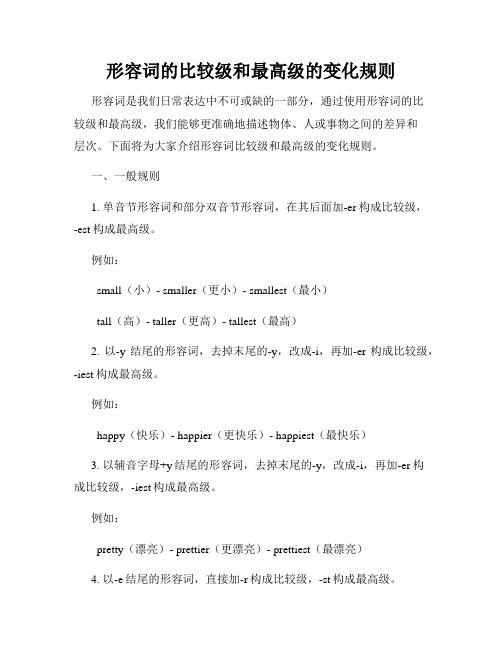
形容词的比较级和最高级的变化规则形容词是我们日常表达中不可或缺的一部分,通过使用形容词的比较级和最高级,我们能够更准确地描述物体、人或事物之间的差异和层次。
下面将为大家介绍形容词比较级和最高级的变化规则。
一、一般规则1. 单音节形容词和部分双音节形容词,在其后面加-er构成比较级,-est构成最高级。
例如:small(小)- smaller(更小)- smallest(最小)tall(高)- taller(更高)- tallest(最高)2. 以-y结尾的形容词,去掉末尾的-y,改成-i,再加-er构成比较级,-iest构成最高级。
例如:happy(快乐)- happier(更快乐)- happiest(最快乐)3. 以辅音字母+y结尾的形容词,去掉末尾的-y,改成-i,再加-er构成比较级,-iest构成最高级。
例如:pretty(漂亮)- prettier(更漂亮)- prettiest(最漂亮)4. 以-e结尾的形容词,直接加-r构成比较级,-st构成最高级。
例如:large(大)- larger(更大)- largest(最大)二、特殊规则1. 以重读闭音节结尾的形容词,双写最后一个辅音字母,再加-er构成比较级,-est构成最高级。
例如:big(大)- bigger(更大)- biggest(最大)hot(热)- hotter(更热)- hottest(最热)2. 部分形容词的比较级和最高级形式有规则变化。
例如:good(好)- better(更好)- best(最好)bad(坏)- worse(更坏)- worst(最坏)far(远)- farther/further(更远)- farthest/furthest(最远)3. 部分形容词的比较级和最高级形式不规则,需记忆。
例如:little(小)- less(较小)- least(最小)much(多)- more(更多)- most(最多)三、注意事项1. 两个或两个以上的形容词连用时,一般在第一个形容词前加the,其他形容词按照比较级或最高级的形式来使用。
形容词比较级和最高级的用法

形容词比较级和最高级的用法一、形容词比较级形容词比较级是一种级别,它指示两个事物之间的比较程度。
如:taller(更高),wider(更宽),faster(更快)等。
二、形容词比较级的构成1、长形容词比较级一般形容词后缀加-er构成比较级,如:tall(高)→ taller(更高)2、以e结尾的形容词比较级以e结尾的形容词后缀加-r构成比较级,如:wise(聪明)→ wiser (更聪明)3、以辅音字母+y结尾的形容词比较级以辅音字母+y结尾的形容词变y为i再加-er,如:busy(忙碌)→ busier(更忙碌)4、双音节与多音节形容词的比较级双音节形容词直接加“more”来构成比较级,如:beautiful(美丽)→ more beautiful(更美丽);多音节形容词直接加“most”来构成比较级,如:careful(小心)→ most careful(最小心)三、形容词最高级形容词最高级,指对三者或三者以上时,表示最高或最多的程度。
通常加上“the”,再加最高级后缀-est或more/most来构成。
1、以-y结尾的形容词最高级以-y结尾的形容词,先把-y变成i,再加-est,如:happy(高兴)→ happiest(最高兴)2、以辅音字母+y结尾的形容词最高级以辅音字母+y结尾的形容词,变y为i,再加-est,如:busy(忙碌)→ busiest(最忙碌)3、以e结尾的形容词最高级以e结尾的形容词,后面直接加-st,如:nice(好)→ nicest(最好的)4、一个音节或双音节的形容词最高级一个音节或双音节的形容词,直接加“the”,再加most来构成,如:high(高)→ the highest(最高);nice(好)→ the nicest(最好的)。
形容词比较级最高级语法
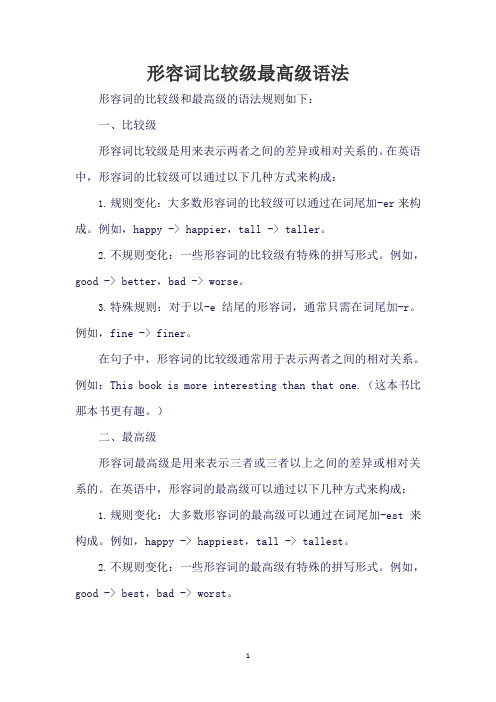
形容词比较级最高级语法形容词的比较级和最高级的语法规则如下:一、比较级形容词比较级是用来表示两者之间的差异或相对关系的。
在英语中,形容词的比较级可以通过以下几种方式来构成:1.规则变化:大多数形容词的比较级可以通过在词尾加-er来构成。
例如,happy -> happier,tall -> taller。
2.不规则变化:一些形容词的比较级有特殊的拼写形式。
例如,good -> better,bad -> worse。
3.特殊规则:对于以-e结尾的形容词,通常只需在词尾加-r。
例如,fine -> finer。
在句子中,形容词的比较级通常用于表示两者之间的相对关系。
例如:This book is more interesting than that one.(这本书比那本书更有趣。
)二、最高级形容词最高级是用来表示三者或三者以上之间的差异或相对关系的。
在英语中,形容词的最高级可以通过以下几种方式来构成:1.规则变化:大多数形容词的最高级可以通过在词尾加-est来构成。
例如,happy -> happiest,tall -> tallest。
2.不规则变化:一些形容词的最高级有特殊的拼写形式。
例如,good -> best,bad -> worst。
3.特殊规则:对于以-e结尾的形容词,通常只需在词尾加-st。
例如,fine -> finest。
在句子中,形容词的最高级通常用于表示三者或三者以上之间的相对关系。
例如:This is the most interesting book I have ever read.(这是我读过的最有趣的书。
)需要注意的是,形容词的比较级和最高级也可以用于表示程度或数量上的差异或相对关系,具体使用情况需要根据语境来判断。
形容词的比较级与最高级

形容词的比较级与最高级形容词是用来描述人、事物特征或性质的词语。
而形容词的比较级和最高级则用于在不同程度上比较事物之间的差异,表达出更具体的概念。
本文将为读者介绍形容词的比较级和最高级的用法,并探讨其在句子中的运用。
一、比较级的构成比较级用于比较两个人或物的差异,它的构成方式如下:1. 单音节词:在形容词前加上-er,如"tall(高)→ taller(更高)"。
2. 双音节词或多音节词:在形容词前加上more,如"beautiful(美丽)→ more beautiful(更美丽)"。
二、比较级的用法比较级的用法主要有以下几种:1. 表示人或物在某一方面的差异:如"Tom is taller than Mike"(汤姆比迈克高)。
2. 表示相对程度:如"She is more intelligent than her classmates"(她比她的同学更聪明)。
3. 表示越来越:如"The weather is getting colder and colder"(天气越来越冷)。
4. 与than连用,表示一个被比较的对象:如"I have more friends than you"(我有比你更多的朋友)。
三、最高级的构成最高级用于比较三个或三个以上的人或物,它的构成方式如下:1. 单音节词在形容词前加上-est,如"tall(高)→ tallest(最高)"。
2. 双音节词或多音节词在形容词前加上most,如"beautiful(美丽)→ most beautiful(最美丽)"。
四、最高级的用法最高级的用法主要有以下几种:1. 表示最高程度:如"He is the tallest boy in our class"(他是我们班最高的男生)。
英语中的形容词比较级和最高级如何构成

英语中的形容词比较级和最高级如何构成?在英语中,形容词的比较级和最高级可以通过以下规则构成:1. 比较级的构成:-一般情况下,在形容词的词尾加上-er:tall(高)→ taller(更高)-如果形容词以字母"e"结尾,只需在词尾加上-r:large(大)→ larger(更大)-如果形容词以辅音字母+y结尾,将"y"变为"i",再加上-er:happy(快乐)→ happier(更快乐)-如果形容词以重读闭音节结尾,且末尾只有一个辅音字母,双写该辅音字母,并加上-er:big(大)→ bigger(更大)2. 最高级的构成:-一般情况下,在形容词的词尾加上-est:tall(高)→ tallest(最高)-如果形容词以字母"e"结尾,只需在词尾加上-st:large(大)→ largest(最大)-如果形容词以辅音字母+y结尾,将"y"变为"i",再加上-est:happy(快乐)→ happiest (最快乐)-如果形容词以重读闭音节结尾,且末尾只有一个辅音字母,双写该辅音字母,并加上-est:big(大)→ biggest(最大)需要注意的是,有一些形容词的比较级和最高级形式是不规则的,需要记忆:- good(好)→ better(更好)→ best(最好)- bad(坏)→ worse(更坏)→ worst(最坏)- far(远)→ farther/further(更远)→ farthest/furthest(最远)此外,有一些形容词的比较级和最高级形式是使用"more"和"most"来构成的,而不是通过词尾的变化:- beautiful(美丽)→ more beautiful(更美丽)→ most beautiful(最美丽)- intelligent(聪明)→ more intelligent(更聪明)→ most intelligent(最聪明)掌握形容词比较级和最高级的构成规则是提高英语语法准确性和表达能力的关键之一。
形容词的比较级和最高级

形容词的比较级和最高级形容词是一类用来描述名词或代词特征的词语,它可以用来表达事物的大小、高度、速度、程度等属性。
在英语中,形容词有三种级别:原级、比较级和最高级。
形容词的比较级和最高级可以用来对两个或多个事物进行比较,以表达它们在某种属性上的差异。
一、形容词的比较级形容词的比较级用来比较两个事物在某个属性上的大小、高度或程度。
一般来说,形容词的比较级可以通过在形容词前加上“-er”来构成。
如果形容词以“e”结尾,只需在后面加上“-r”;如果形容词以辅音字母加“y”结尾,则将“y”变为“i”,再加上“-er”。
例如:1. 高→ 高的→ 更高的(tall → taller)2. 大→ 大的→ 更大的(big → bigger)3. 漂亮→ 漂亮的→ 更漂亮的(beautiful → more beautiful)4. 智慧→ 智慧的→ 更智慧的(intelligent → more intelligent)如果形容词以重读闭音节结尾,且末尾只有一个辅音字母时,则需将最后一个辅音字母双写,并在后面加上“-er”。
例如:1. 适中→ 适中的→ 更适中的(fit → fitter)需要注意的是,有一些形容词的比较级是不规则的,需要单独记忆。
下面是一些常见的不规则比较级形式:1. 好→ 好的→ 更好的(good → better)2. 小→ 小的→ 更小的 (l ittle → less)3. 多→ 多的→ 更多的(many → more)4. 远→ 远的→ 更远的(far → farther/further)形容词的比较级在句子中一般用于比较两个事物之间的差异。
比较级可以与"than"搭配使用,构成比较结构。
例如:1. 这本书比那本书更有趣。
(This book is more interesting than that book.)2. 这座建筑物比那座建筑物高得多。
(This building is much tallerthan that building.)二、形容词的最高级形容词的最高级用来表达一组事物中某个属性的极限。
比较级和最高级的构成
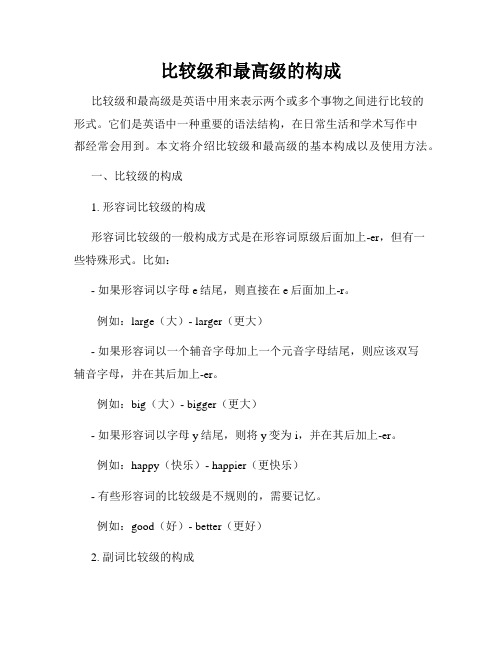
比较级和最高级的构成比较级和最高级是英语中用来表示两个或多个事物之间进行比较的形式。
它们是英语中一种重要的语法结构,在日常生活和学术写作中都经常会用到。
本文将介绍比较级和最高级的基本构成以及使用方法。
一、比较级的构成1. 形容词比较级的构成形容词比较级的一般构成方式是在形容词原级后面加上-er,但有一些特殊形式。
比如:- 如果形容词以字母e结尾,则直接在e后面加上-r。
例如:large(大)- larger(更大)- 如果形容词以一个辅音字母加上一个元音字母结尾,则应该双写辅音字母,并在其后加上-er。
例如:big(大)- bigger(更大)- 如果形容词以字母y结尾,则将y变为i,并在其后加上-er。
例如:happy(快乐)- happier(更快乐)- 有些形容词的比较级是不规则的,需要记忆。
例如:good(好)- better(更好)2. 副词比较级的构成副词比较级的构成方式是在副词原级后面加上-er,但也有一些特殊情况:- 如果副词以字母e结尾,则直接在e后面加上-r。
例如:late(晚)- later(更晚)- 如果副词以字母y结尾,则将y变为i,并在其后加上-er。
例如:happy(快乐地)- happier(更快乐地)- 有些副词的比较级是不规则的,需要记忆。
例如:well(好)- better(更好)二、最高级的构成1. 形容词和副词最高级的构成形容词和副词最高级的构成方式是在形容词或副词的比较级前面加上"the",并在其后加上-est。
同样,也有一些特殊形式需要记忆:- 如果形容词或副词以字母e结尾,则在e后面加上-st。
例如:large(大)- largest(最大)- 如果形容词或副词以一个辅音字母加上一个元音字母结尾,则应该双写辅音字母,并在其后加上-est。
例如:big(大)- biggest(最大)- 如果形容词或副词以字母y结尾,则将y变为i,并在其后加上-est。
形容词比较级和最高级的构成

★形容词比较级和最高级的构成:1.一般在原级后加er 构成比较级,加est构成最高级。
e.g. small smaller smallestyoung younger youngest2.以不发音的字母e 结尾的形容词,直接加r 或st 构成比较级和最高级。
e.g. nice nicer nicestlate later latest3.以辅音字母+y 结尾的形容词,变y为i ,再加er 或est, 构成比较级和最高级。
e.g. busy busier busiestheavy heavier heaviest4.在重读闭音节中,末尾只有一个辅音字母的形容词,要先双写这个辅音字母,再加er或est,构成比较级和最高级。
e.g. hot hotter hottestbig bigger biggest5.个别形容词的比较级和最高级是不规则变化,需个别记忆。
e.g. good (well) better bestbad (badly, ill) worse worstmany(much) more mostlittle less leastfar father farthest或further furthest★副词的比较级和最高级:1.以ly 结尾的副词,除early 变为earlier 和earliest 外,其余一律在其前加more 和most。
如:carefully – more carefully – most carefully2.规则变化直接加er 和est 。
如:fast – faster—fastest3.个别词是不规则变化,需要特别记忆。
如:well – better – bestfar – farther – fastestbadly – worse – worst4.句子中,副词最高级前的the 可省略也可以不省略,但形容词最高级前面的the 绝对不能去掉。
形容词比较级和最高级的用法
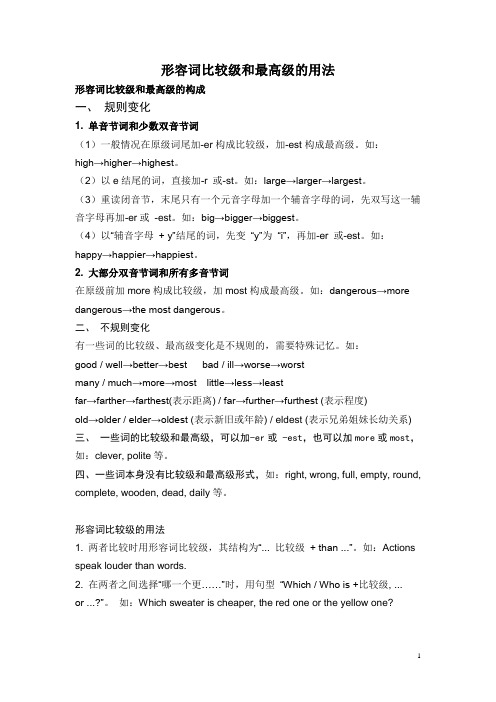
形容词比较级和最高级的用法形容词比较级和最高级的构成一、规则变化1. 单音节词和少数双音节词(1)一般情况在原级词尾加-er构成比较级,加-est构成最高级。
如:high→higher→highest。
(2)以e结尾的词,直接加-r 或-st。
如:large→larger→largest。
(3)重读闭音节,末尾只有一个元音字母加一个辅音字母的词,先双写这一辅音字母再加-er或-est。
如:big→bigger→biggest。
(4)以“辅音字母+ y”结尾的词,先变“y”为“i”,再加-er 或-est。
如:happy→happier→happiest。
2. 大部分双音节词和所有多音节词在原级前加more构成比较级,加most构成最高级。
如:dangerous→more dangerous→the most dangerous。
二、不规则变化有一些词的比较级、最高级变化是不规则的,需要特殊记忆。
如:good / well→better→best bad / ill→worse→worstmany / much→more→most little→less→leastfar→farther→farthest(表示距离) / far→further→furthest (表示程度)old→older / elder→oldest (表示新旧或年龄) / eldest (表示兄弟姐妹长幼关系) 三、一些词的比较级和最高级,可以加-er或 -est,也可以加more或most,如:clever, polite等。
四、一些词本身没有比较级和最高级形式,如:right, wrong, full, empty, round, complete, wooden, dead, daily等。
形容词比较级的用法1. 两者比较时用形容词比较级,其结构为“... 比较级+ than ...”。
如:Actions speak louder than words.2. 在两者之间选择“哪一个更……”时,用句型“Which / Who is +比较级, ...or ...?”。
形容词的比较级最高级用法小结
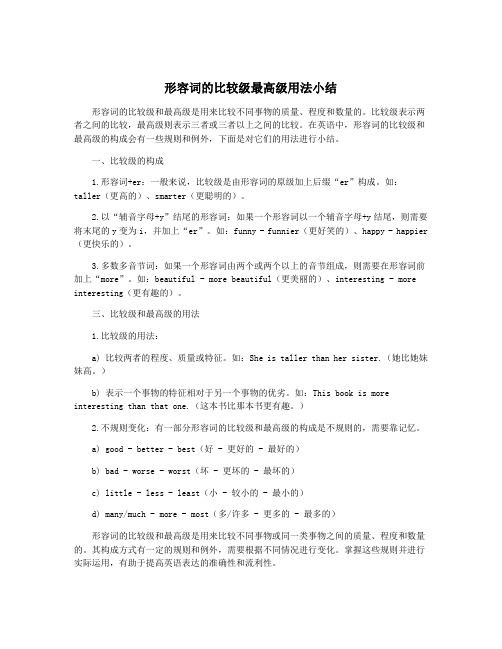
形容词的比较级最高级用法小结形容词的比较级和最高级是用来比较不同事物的质量、程度和数量的。
比较级表示两者之间的比较,最高级则表示三者或三者以上之间的比较。
在英语中,形容词的比较级和最高级的构成会有一些规则和例外,下面是对它们的用法进行小结。
一、比较级的构成1.形容词+er:一般来说,比较级是由形容词的原级加上后缀“er”构成。
如:taller(更高的)、smarter(更聪明的)。
2.以“辅音字母+y”结尾的形容词:如果一个形容词以一个辅音字母+y结尾,则需要将末尾的y变为i,并加上“er”。
如:funny - funnier(更好笑的)、happy - happier (更快乐的)。
3.多数多音节词:如果一个形容词由两个或两个以上的音节组成,则需要在形容词前加上“more”。
如:beautiful - more beautiful(更美丽的)、interesting - more interesting(更有趣的)。
三、比较级和最高级的用法1.比较级的用法:a) 比较两者的程度、质量或特征。
如:She is taller than her sister.(她比她妹妹高。
)b) 表示一个事物的特征相对于另一个事物的优劣。
如:This book is more interesting than that one.(这本书比那本书更有趣。
)2.不规则变化:有一部分形容词的比较级和最高级的构成是不规则的,需要靠记忆。
a) good - better - best(好 - 更好的 - 最好的)b) bad - worse - worst(坏 - 更坏的 - 最坏的)c) little - less - least(小 - 较小的 - 最小的)d) many/much - more - most(多/许多 - 更多的 - 最多的)形容词的比较级和最高级是用来比较不同事物或同一类事物之间的质量、程度和数量的。
形容词的比较级和最高级

形容词的比较级和最高级形容词是描述性词语,用于修饰名词或代词,用来表达人、事物或概念的特征和属性。
当我们想要对事物进行比较时,比较级和最高级就派上了用场。
比较级用来比较两个人或物之间的差异,表示“更……”、“比……更……”之意。
形容词的比较级有规律和不规律两种形式。
规律比较级的构成:在形容词后加上“er”。
如:1. 高(tall)- 比较高(taller)2. 富有(rich)- 更富有(richer)3. 长(long)- 更长(longer)当形容词以“e”结尾时,只需在其后加上“r”。
例如:1. 大(large)- 更大(larger)2. 短(short)- 更短(shorter)如果形容词以“辅音字母+元音字母+辅音字母”结尾,且重读最后一个音节时,需双写末尾的辅音字母,并加上“er”。
如:1. 重(heavy)- 更重(heavier)2. 热(hot)- 更热(hotter)不规律比较级则需要变化形态,例如:1. 好(good)- 更好(better)2. 多(many)- 更多(more)3. 少(few、little)- 更少(fewer、less)另外,当比较级前面有“than”时,表示与之前的人或物相比更……。
例如:1. 我比我弟弟更高。
I am taller than my younger brother.2. 这只猫比那只狗更可爱。
This cat is cuter than that dog.最高级用来表示同一类人或事物中最高的一项,表示“最……”或“最高的”。
构成最高级形容词,需要在形容词前加上“the”并在后面加上“est”。
如:1. 高(tall)- 最高的(the tallest)2. 富有(rich)- 最富有的(the richest)3. 长(long)- 最长的(the longest)当形容词以“e”结尾时,只需在其前加上“th”。
例如:1. 大(large)- 最大的(the largest)2. 短(short)- 最短的(the shortest)如果形容词以“辅音字母+元音字母+辅音字母”结尾,且重读最后一个音节时,需双写末尾的辅音字母,并加上“est”。
形容词比较级和最高级变化规则
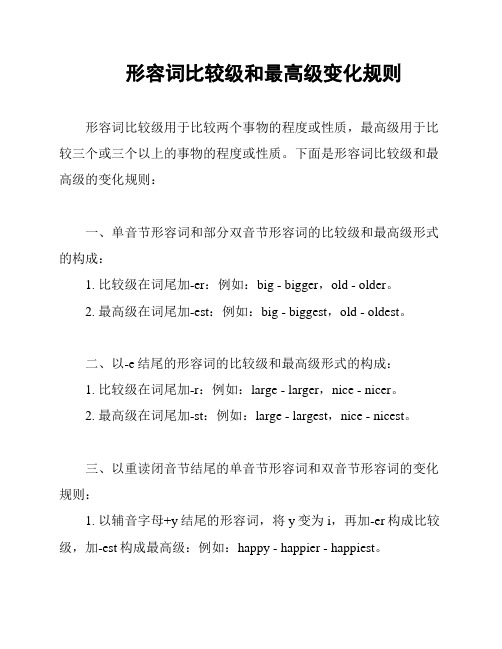
形容词比较级和最高级变化规则形容词比较级用于比较两个事物的程度或性质,最高级用于比较三个或三个以上的事物的程度或性质。
下面是形容词比较级和最高级的变化规则:一、单音节形容词和部分双音节形容词的比较级和最高级形式的构成:1. 比较级在词尾加-er:例如:big - bigger,old - older。
2. 最高级在词尾加-est:例如:big - biggest,old - oldest。
二、以-e结尾的形容词的比较级和最高级形式的构成:1. 比较级在词尾加-r:例如:large - larger,nice - nicer。
2. 最高级在词尾加-st:例如:large - largest,nice - nicest。
三、以重读闭音节结尾的单音节形容词和双音节形容词的变化规则:1. 以辅音字母+y结尾的形容词,将y变为i,再加-er构成比较级,加-est构成最高级:例如:happy - happier - happiest。
2. 以一个辅音字母结尾的双音节形容词,双写辅音字母,再加-er构成比较级,加-est构成最高级:例如:thin - thinner - thinnest。
四、其他形容词的比较级和最高级形式的构成:1. 形容词前加more构成比较级,加most构成最高级:例如:beautiful - more beautiful - most beautiful。
2. 不规则变化的形容词,需要记忆其变化规则:例如:good - better - best。
需要注意的是,有些形容词的比较级和最高级形式不按以上规则变化,而是需记忆其变化形式。
形容词比较级和最高级的变化规则对于学习英语的同学来说是非常重要的基础知识,只有掌握了这些规则,才能正确运用形容词进行比较和描述。
形容词副词的比较级和最高级总结
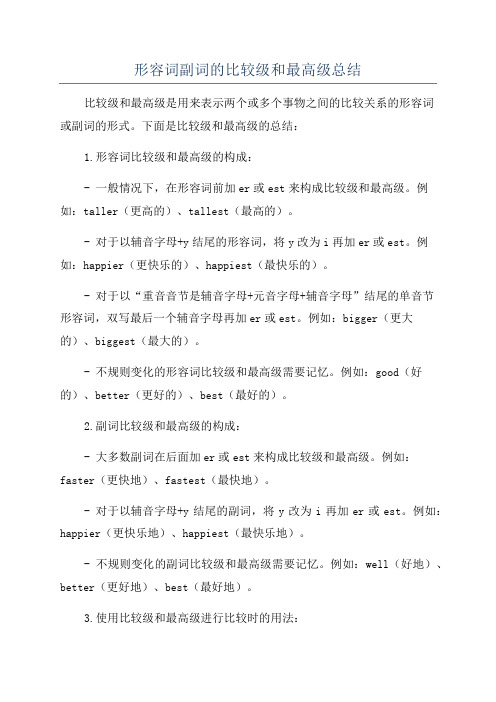
形容词副词的比较级和最高级总结比较级和最高级是用来表示两个或多个事物之间的比较关系的形容词或副词的形式。
下面是比较级和最高级的总结:1.形容词比较级和最高级的构成:- 一般情况下,在形容词前加er或est来构成比较级和最高级。
例如:taller(更高的)、tallest(最高的)。
- 对于以辅音字母+y结尾的形容词,将y改为i再加er或est。
例如:happier(更快乐的)、happiest(最快乐的)。
- 对于以“重音音节是辅音字母+元音字母+辅音字母”结尾的单音节形容词,双写最后一个辅音字母再加er或est。
例如:bigger(更大的)、biggest(最大的)。
- 不规则变化的形容词比较级和最高级需要记忆。
例如:good(好的)、better(更好的)、best(最好的)。
2.副词比较级和最高级的构成:- 大多数副词在后面加er或est来构成比较级和最高级。
例如:faster(更快地)、fastest(最快地)。
- 对于以辅音字母+y结尾的副词,将y改为i再加er或est。
例如:happier(更快乐地)、happiest(最快乐地)。
- 不规则变化的副词比较级和最高级需要记忆。
例如:well(好地)、better(更好地)、best(最好地)。
3.使用比较级和最高级进行比较时的用法:- 比较级用于比较两个事物。
例如:She is taller than her sister.(她比她妹妹高。
)- 最高级用于比较三个或三个以上事物。
例如:He is the tallest boy in the class.(他是班上最高的男孩。
)- 当比较的对象是不可数名词时,使用more或most来构成比较级和最高级。
例如:She has more money than him.(她比他有更多的钱。
形容词的比较级和最高级的构成方式
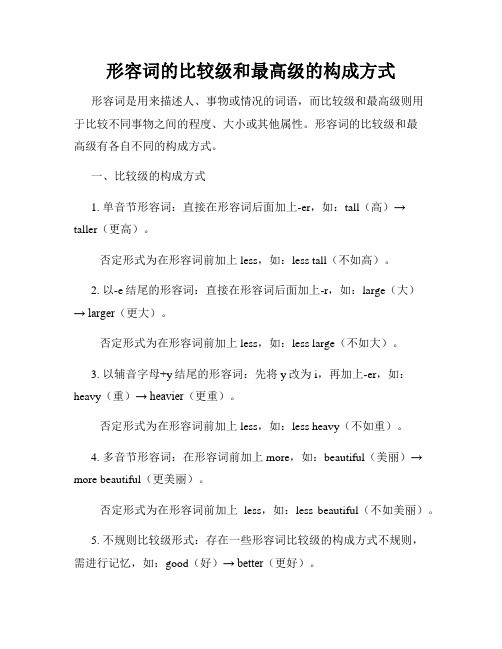
形容词的比较级和最高级的构成方式形容词是用来描述人、事物或情况的词语,而比较级和最高级则用于比较不同事物之间的程度、大小或其他属性。
形容词的比较级和最高级有各自不同的构成方式。
一、比较级的构成方式1. 单音节形容词:直接在形容词后面加上-er,如:tall(高)→ taller(更高)。
否定形式为在形容词前加上less,如:less tall(不如高)。
2. 以-e结尾的形容词:直接在形容词后面加上-r,如:large(大)→ larger(更大)。
否定形式为在形容词前加上less,如:less large(不如大)。
3. 以辅音字母+y结尾的形容词:先将y改为i,再加上-er,如:heavy(重)→ heavier(更重)。
否定形式为在形容词前加上less,如:less heavy(不如重)。
4. 多音节形容词:在形容词前加上more,如:beautiful(美丽)→ more beautiful(更美丽)。
否定形式为在形容词前加上less,如:less beautiful(不如美丽)。
5. 不规则比较级形式:存在一些形容词比较级的构成方式不规则,需进行记忆,如:good(好)→ better(更好)。
否定形式为在形容词前加上less,如:less good(不如好)。
二、最高级的构成方式1. 单音节形容词:在形容词前加上the,然后加上-est,如:tall(高)→ the tallest(最高)。
否定形式为在the前加上least,如:the least tall(最不高)。
2. 以-e结尾的形容词:在形容词前加上the,然后加上-st,如:large(大)→ the largest(最大)。
否定形式为在the前加上least,如:the least large(最不大)。
3. 以辅音字母+y结尾的形容词:先将y改为i,再加上-est,如:heavy(重)→ the heaviest(最重)。
形容词比较级和最高级的构成与用法
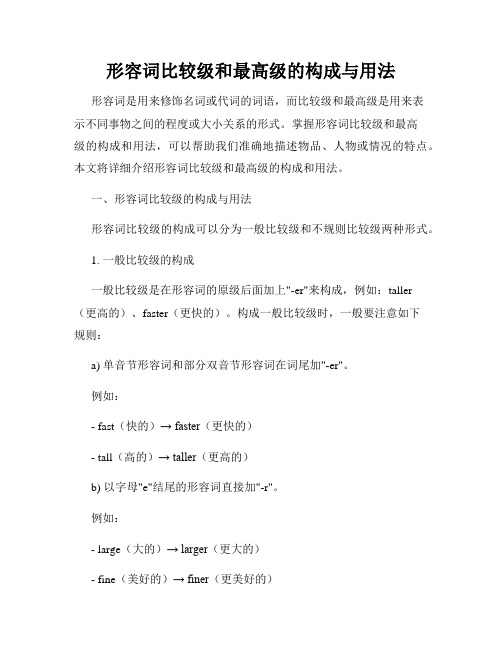
形容词比较级和最高级的构成与用法形容词是用来修饰名词或代词的词语,而比较级和最高级是用来表示不同事物之间的程度或大小关系的形式。
掌握形容词比较级和最高级的构成和用法,可以帮助我们准确地描述物品、人物或情况的特点。
本文将详细介绍形容词比较级和最高级的构成和用法。
一、形容词比较级的构成与用法形容词比较级的构成可以分为一般比较级和不规则比较级两种形式。
1. 一般比较级的构成一般比较级是在形容词的原级后面加上"-er"来构成,例如:taller(更高的)、faster(更快的)。
构成一般比较级时,一般要注意如下规则:a) 单音节形容词和部分双音节形容词在词尾加"-er"。
例如:- fast(快的)→ faster(更快的)- tall(高的)→ taller(更高的)b) 以字母"e"结尾的形容词直接加"-r"。
例如:- large(大的)→ larger(更大的)- fine(美好的)→ finer(更美好的)c) 以辅音字母加"y"结尾的形容词,变"y"为"i",然后加"-er"。
例如:- happy(快乐的)→ happier(更快乐的)- busy(忙碌的)→ busier(更忙碌的)2. 不规则比较级的构成不规则比较级是指一些形容词比较级的构成不遵循一般规则,需要单独记忆和使用。
例如:- good(好的)→ better(更好的)- bad(坏的)→ worse(更坏的)- little(小的)→ less(更小的)一般比较级的用法主要有以下几种情况:a) 比较两个物品或人物的特征或性质,并表示它们之间的差异。
例如:- His car is faster than mine.(他的车比我的快。
)- This book is more interesting than that one.(这本书比那本书更有趣。
形容词的比较级和最高级

形容词的比较级和最高级形容词的比较级和最高级一、比较级1.定义:比较级是用来比较两个事物之间的差异或程度。
通常,我们使用形容词的比较级来表示“更”或“较”的概念。
2.构成规则:大多数形容词的比较级可以通过加-er后缀来构成。
例如:good - betterbad - worseold - older3. 使用方法:在句子中,比较级通常与than或than any other +单数名词连用。
例如:John is younger than his brother. 约翰比他的哥哥年轻。
Jane is more intelligent than anyone else in the class. 简比班上其他任何人都聪明。
二、最高级1.定义:最高级用于描述一个事物在特定范围内是最高或最大的。
2.构成规则:大多数形容词的最高级可以通过加-est后缀来构成。
例如:good - bestbad - worstold - oldest3. 使用方法:在句子中,最高级通常与of all或in + 范围连用。
例如:Tom is the tallest in his class. 汤姆是他们班上最高的。
Jane is the most intelligent student in the class. 简是班上最聪明的学生。
练习:请根据所给答案纠正你的错误,并重新做一遍。
1.She sings ___in her class. (beautiful)2.答案:best3.He is ___than his brother. (tall)4.答案:taller5.This book is ___than that one. (interesting)6.答案:more interesting7.The ___of all the cars here is the red one. (beautiful)8.答案:most beautiful9.She studies harder than any other student ___class. (in)。
- 1、下载文档前请自行甄别文档内容的完整性,平台不提供额外的编辑、内容补充、找答案等附加服务。
- 2、"仅部分预览"的文档,不可在线预览部分如存在完整性等问题,可反馈申请退款(可完整预览的文档不适用该条件!)。
- 3、如文档侵犯您的权益,请联系客服反馈,我们会尽快为您处理(人工客服工作时间:9:00-18:30)。
形容词比较级和最高级的构成1. 规则变化单音节词和少数多音节词:1^般直接加-er, est long long er longe st tall tall er tall est2H不发音的e 结尾时加-r, -st late late r latest large large r large st3以辅音字母加y结尾时把y变成i,再加-er, -est . easy easier easiesthappy happ ier happ iest happily happ ilier happ iliest4以重度闭音节结尾且末尾只有一个辅音字母时,双写最后的辅音字母,再加-er, -est.big big ger big gest hot hot ter hot test5多音节词和部分双音节词,在原级前加more, the most.careful more careful most careful beautiful more beautiful mostbeautiful原级比较1) 肯定句:A••-.. +as +形容词原级+as +BEnglish is as interesting as Chinese.This book is as thick as that one.2) 否定句:A••- ..+as/so+形容词原级+ as + BTom is not so tall as Tim.This village is not as big as that one.比较级1 .表示两者进行比较时, A ••• +比较级+ than + B.Lily's room is bigger than mine.My classroom is smaller than hers.2 .有表示程度的fPJ 词 a little , a bit , a great deal , a lot ,much, even ,still, far, rather, any 等修饰形容词时,It's much colder today than yesterday.This bottle is a little bigger than that one.为了避免重复,在从句中常用the one ,that , those 等词代替前面出现过的词,其中the one 代替可数名词单数形式,the ones 和those 代替可数名词的复数形式,that 代替不可数名词。
The weather of Tianjin is colder than that of Guangzhou in winter.The cars made in Germany is better than those made in Japan.3. 表示两者之间进行选择,哪一个更….."时,用句型Which / who is + 形容词比较级,A or B?”Who is the taller, Liming or Wangtao?Which one is the longer, the pen or the pencil?4. 表示越来越...... ”,用比较级的重叠结构,即比较级+and +比较级”,当形容词为多音节词或部分双音节词时,用more and more + 形容词原级"。
It's getting warmer and warmer in spring.It's colder and colder in winter.5. 表示越….,就越…."时,用the +比较级,the +比较级"结构The more, the better.The more you eat, the fatter you will be.最高级1. 表示三者或三者以上的人或物的比较,最高级前必须加定冠词the,句末常跟in/of短语来表示围。
Shanghai is the biggest city in China.Tim is the tallest student in my classroom.2. 表示三者或三者以上的人或物进行选择时,用Which/Who is the + 最高级,A, B or C?”Which city is the most beautiful , Beijing, Shanghai or Fuzhou? Who is the best student, Lily, Lucy or Betty?3. 表示最…..的•••.之一时,用one of the +形容词最高级”结构,该形容词后面的名词要用复数形式。
Zhou Jielun is one of the most popular singers.Gongli is one of the most beautiful actresses in China.4. 形容词最高级前面可以加序数词,表示第几最…..The Yellow River is the second longest river in China.5. 形容词最高级前可以有物主代词、指示代词、名词所有格等修饰,此时不能再用定冠词。
This is our best lesson today.Friday is my busiest day in a week.6. 形容词比较级结构可以表示最高级含义。
Li Lei is the tallest student in his class(雷是他班上最高的同学)=Li Lei is taller than any other student in his class.=Li Lei is taller than the other students in his class.=Li Lei is taller than anyone else in his class.=No one is as tall as Li Lei in his class.=No one is taller than Li Lei in his class.=Li Lei is taller than any of the other students in his class.=Li Lei is taller than the rest of students in his class.达标PK E单项选择( )1. A pig is __ than a dog.A. much heavyB. more heavier C much heavier D. more heavy( )2. ------ Which is __ season in Beijing?---- I think it 's spring.A.goodB. wellC. bestD. the best).The city is becomingA. more beautiful and moreB. more beautiful and beautifulD. more beautiful and beautifuler )4. Which does Alice like)5. The Changjiang River is one ofboys in Class Two than in Class Four.oranges now, Jim, Lily or Lucy?9. Mother isin my family.A. so tallest asB. as taller as用适当形式填空:1. Yingtian is not as(tall) asYongxian.A. wellB. bestC. betterD. muchA. the longest riverB. longest riversC. the longest riversD. longer rivers A. very6. LiMing speaks Chinesebetter than me.B. moreC. a lot ofD. muchA. moreB. manyC. mostD. bestA. muchB. biggestC. betterD. the mostA. busyB. busierC. the busiestD. more10. No one isLucy in the class.2. Which is (heavy), a hen or a chicken?3. -- How (tall) is Sally? She's 1.55 metres (tall). What about Xiaoling? --She's only 1.40 metres(tall). She is much the(short)girl inthe class.(short) than Sally. She is alsoC. more and more beautiful,Chinese or Art?in the world. 7.There are8. Who hasC. so high asD. as tall as4. He is(bad) at learning maths. He is much(bad) at Chinese and he is the(bad) at English.5. An orange ia a little(big) than an apple, but much(small) than a watermelon.6. Miss Chen is than Mr. Wang. (popular)7. A rose ___________________________________ a vWed(). (beautiful)8. Good health is thing in our life. (important)9. He is than any other boy in the class. (clever)10. Where is the bus-stop? (near)11. Tom drives much than John. (careful)12. English is one of (important)(科目) in our school.13. Who's the third (heavy) in your class?14. You speak English much (well) than before.15. (hard) you work, (good) grades you 'll get.16. He's (funny) person that I have seen.【巩固练习】( )1. -Remember this, children.careful you are,mistakes you will make.-We know, Mr. Li.A. The more; the moreB. The fewer; the moreC. The more; the fewerD. The less; the less( )2. - Mum, I was the first to reach the top of the mountain.-Good job, Jack! I'm of you.A. carefulB. proudC. tiredD. afraid( )3. -It's one of the things in the world to stay with friends.-I agree. It always makes us relaxed.A. worstB. happiestC. busiestD. hardest( )4. -What does your brother look like?-He is.A. fineB. nice and friendlyC. goodD. tall and handsome ( )5. It's really that a tortoise can 150 years old.A. amazed; live toB. amazed; live up toC. amazing; live upD. amazing; live to( )6. In a green school, everyone agrees to be about the environment.A. nervousB. carefulC. honestD. rude语法选择It was Saturday yesterday. My classmates and __1__ went to visit the old people 's home. It was quite far away from our school, so we went there by __2__ bus.After forty minutes we __3__ there. When the old people saw __4__, they were excited. We did a lot of things that day. First, we cleaned __5__ houses. It took us the whole morning __6__ the cleaning. And then we cooked and had lunch __7__ them.In the afternoon we had a party. Some of us sang and danced for the old people. Some told them funny stories. At last, we talked with each other __8__ many things. We were really happy that we could make these old people __9__.We were very tired when we left. __10__ we thought it was a great time for all of us. We felt that we were members of a big family. 1. A. I B. my C. me D. mine 2. A. a B. an C. the D./ 3. A. get B. gets C. are getting D. got 4. A. ourselves B. our C. us D. we 5. A. its B. our C. your D. their 6. A. doing B. does C. do D. to do 7. A. for B. with C. by D. to 8. A. of B. on C. about D. into 9. A. to laugh B. laugh C. laughing D. laughed 10. A. AndB. OrC. ThenD. But完型填空London is such a wonderful city. It is very large. The River Thames runs l the city from)7. -Dad, would you please drive ?-No hurry. We have enough time before the plane takes off. A. fasterB. more slowlyC. more carefullyD.slowier()8. Lanzhou is the only capital city that the Yellow River, the secondpasses through.A. longB. longest )9. Fishing with Dad was so A. excitedB. exciting)10. -Peter is than you, right?-Yes, but he runs in our class. A. heavier; fastest C. heavier; fasterriver in China,C. longerD. lengthfor little Sam that he almost fell asleep.C. boredD. boringB. heavy; the fastest D. heavy; fasterwest to east. So the city has two parts. They 2 the south and the north. In the north, there are important buildings, shops, big parks and other 3 places.The weather in London is good. In winter it is not very cold and in summer it is not very hot 4 the city is near to the sea. People say that London is a foggy city and it often rains.It is true. Last year, when I 5 in London, I saw one of the 6 fogs in years. I could hardly see my hands in front of my face. Cars and buses moved along with their lights on.When evening came, the weather 7 even worse. The fog was as thick as milk. All the buses 8.I happened to have _9 _ important meeting on the other side of the town, but it was impossible 10 find a car. I had to get there on foot.()1. A. across B. through C. along D. in()2. A. is B. w as C. were D. are()3. A. interesting B. i nterested C. interest D. interests ()4. A. so B. b ut C. and D. because()5. A. is B. w as C. were D. .am()6. A. thicker B. t hickest C. most thick D. thick()7. A. is getting B. g ets C. get D. g ot()8. A. stops B. w ere stopping C. stopped D. stop()9. A. an B. a C. the D. /()10. A. for B. t o C. in D. of阅读理解Australia is the biggest island country in the world. It is in the southern part of the earth.So when Australia has a hot summer there, we have a cold winter here.Australia has a large area, but it has only a population of over 17,000,000.Canberra is the capital of Australia. But to visit the world-famous Opera House, you must go to Sydney. Australia is a farming country. People call it "a country on the sheep's back". There, you can find lots of sheep and kangaroos.Alice Spring and Ayers Rock are two interesting places in the centre of Australia. Many people like to visit them. Ayers Rock is the biggest rock on Earth. It is 3487 metres high, and you may not believe that it changes colour in the sunlight if you don 't see it yourself.So, if you go traveling around Australia, there will be lots of things to see and lots of places to visit.( )1. Australia is a country withA. lots of populationB. lots of rocksC. a large area and a large population.D. a large area and a small population()2. People call Australia "A country on the sheep's back", because.A. Australians stand on the sheep 's backB. there are lots of sheep in AustraliaC. Australia is a big countryD. there are lots of kangaroos in that country( )3. When we are in summer, Australians are in.A. springB. summerC. autumnD. winter ( )4. Ayers Rock is.A. a placeB. a foreign visitorC. the name of a rockD. an island ()5. Which is NOT true in the passage?A. Australia is an island country.B. Australia is famous for kangaroos.C. All the Australians are on the sheep's back.D. You can see the world-famous Opera House in Australia.。
